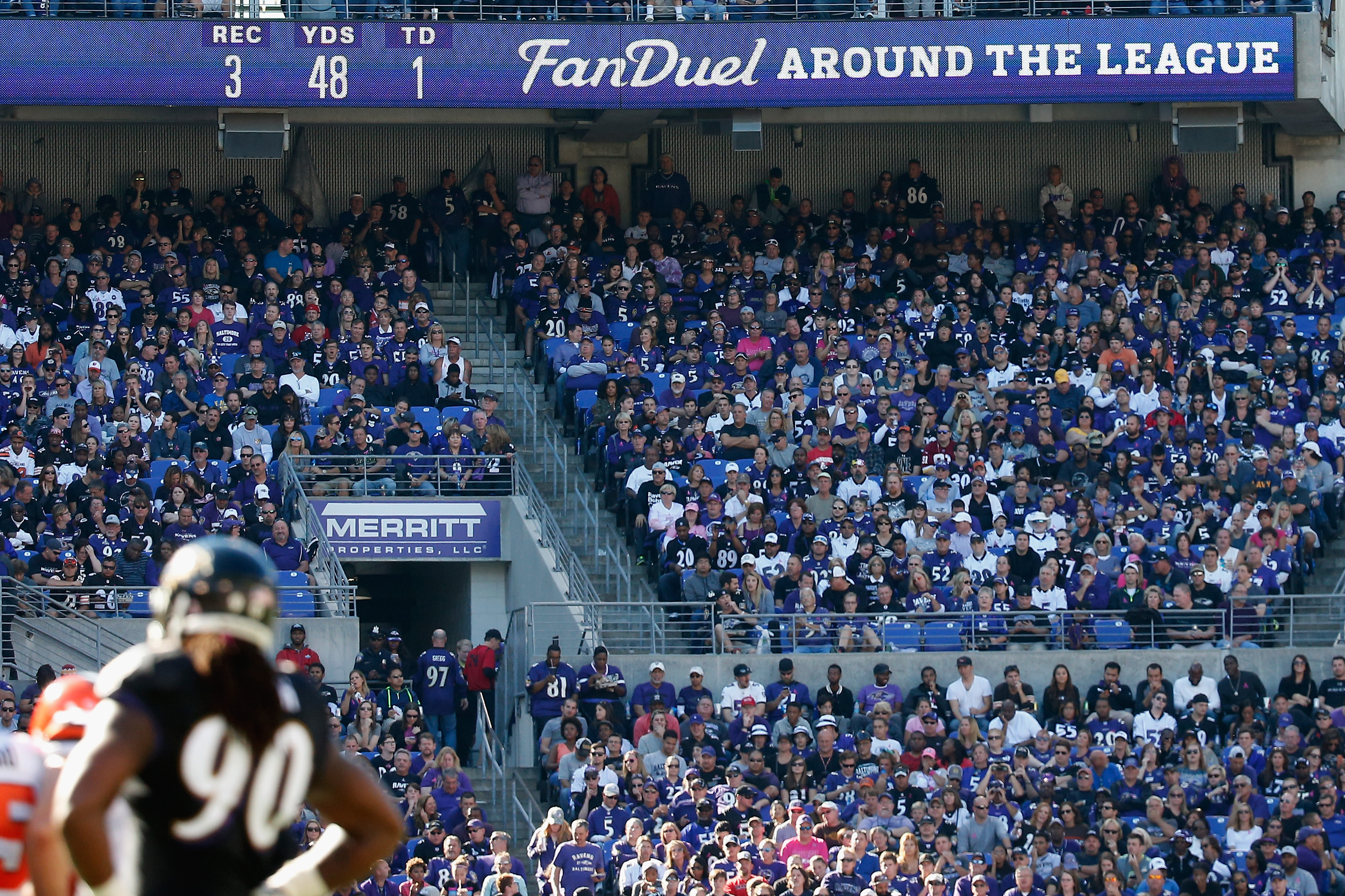Dueling Court Opinions Leave Fantasy Sites With Little Clarity in N.Y.

BALTIMORE, MD - OCTOBER 11: An ad for Fan Duel is shown during the second half of the Baltimore Ravens and Cleveland Browns game at M&T Bank Stadium on October 11, 2015 in Baltimore, Maryland. (Photo by Rob Carr/Getty Images)
It was a whiplash day in the courts for the embattled daily fantasy sports websites DraftKings and FanDuel on Friday. A New York judge first upheld an injunction barring the two sites from operating in the state, and hours later, an appeals court reversed that decision for now.
This means that the roughly 1.2 million FanDuel and DraftKings customers in New York can continue to use both sites at least through the end of the year, but the appeals court ruling fails to resolve the sites’ long-term future in the state — their largest market in the nation.
At issue is whether the companies’ business model constitutes illegal gambling under New York law, a charge that they have both ardently denied. The outcome of the case carries implications beyond New York, as a final ruling there could shape legal challenges to the industry in at least eight other states.
The two sites have combined to turn daily fantasy sports play into a multibillion dollar industry. Customers choose professional athletes for virtual team rosters that they build, and pay entry fees between $0.25 and $10,600 to face off against other contestants. The better an athlete performs in real life, the higher the potential payout. The websites keep about 10 percent of the fees; the rest goes into a pool awarded to winners. The industry as a whole is expected to earn around $2.6 billion this year just in entry fees. By 2020, that figure is projected to swell to $14.4 billion.
In October, New York Attorney General Eric Schneiderman launched an investigation into allegations that employees at FanDuel and DraftKings were using inside information to win money on the websites. The investigation soon expanded into whether the business model of fantasy sports sites broke New York law, which outlaws contests that are substantially chance-based. DraftKings and FanDuel argue that daily fantasy sports are games of skill, which are permitted under state law.
The investigation resulted in a rapid-fire series of legal setbacks for the fantasy sports giants. On Nov. 10, the attorney general served the companies with a cease and desist letter, saying “that DraftKings’/FanDuel’s operations constitute illegal gambling.” Three days later, the sites responded with complaints against the attorney general, arguing that he overstepped his authority and asking the court for a temporary restraining order to block enforcement action against them.
But on Nov. 16, Justice Manuel Mendez of the state’s supreme court ruled against the companies. The decision gave Schneiderman the green light to pursue action against DraftKings and FanDuel, which he did the following day, asking the court to stop the companies from conducting “repeated, ongoing, illegal and fraudulent activities” in New York. FanDuel, which is headquartered in New York, stopped accepting bets from customers, but Boston-based DraftKings continued operating.
In his ruling on Friday, Mendez granted the injunction against the websites, writing that New York outlaws gaming “in which the outcome depends in a material degree upon an element of chance,” even if the skill of the contestants is also a factor in those games.
FanDuel and DraftKings immediately appealed the decision to the New York Supreme Court Appellate Division. Just hours after the injunction was upheld, appellate court Judge Paul Feinman issued an emergency temporary stay of Mendez’s ruling.
“We know that fantasy sports are not illegal, which is a reason for optimism. We know they’re a game of skill, not a game of chance — another reason for optimism,”said Josh Schiller, an attorney for DraftKings, in an interview with FRONTLINE. “There’s no reason for New Yorkers to believe that fantasy sports will stop in New York either this year or next year.”
FanDuel responded to the rulings in a statement, saying, “This is only the beginning of the legal process … The court specifically noted that this was not a final determination of the issue and that discovery would be needed to fully resolve the legal question, which we think should be decided in our favor when all of the evidence is in.”
Daniel Wallach, a sports and gaming attorney with the firm of Becker and Poliakoff in Florida, was skeptical that the companies will be allowed to stay in New York in the short-term, noting that it has among the strictest gambling laws in the country. But in the long-run, he said, their chances appear much better.
“The question today is the legality of fantasy sports, but state legislatures across the country have shown an appetite for changing those laws, for legalizing and regulating fantasy sports,” he said. “The day will come when fantasy sports have a path to legality in all 50 states. This is too big an industry to disappear, though it might have some obstacles along the way.”
Schiller said that DraftKings will continue to operate in New York; it remained unclear if FanDuel would restart operations in New York in the interim. A high court panel will convene in January to consider the injunction more extensively.





